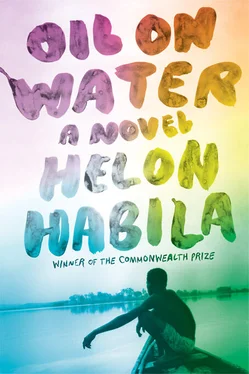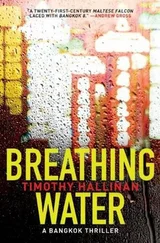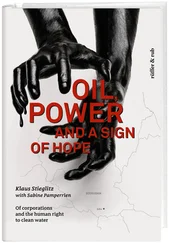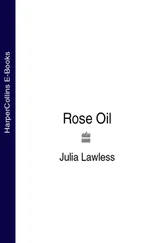About an hour after we set out our engine spluttered, spewed out a thick clump of black smoke and went quiet. The old man and his son fiddled with the engine and attempted to restart it, but finally they gave up and we took turns rowing with oars. We rested by the riverbank whenever we could, and by the time we got to the next village the sun was going down and we left the boat on the deserted beach and went to look for shelter for the night.
It turned out this wasn’t a village at all. It looked like a setting for a sci-fi movie: the meager landscape was covered in pipelines flying in all directions, sprouting from the evil-smelling, oil-fecund earth. The pipes crisscrossed and interconnected endlessly all over the eerie field. We walked inland, ducking under or hopping over the giant pipes, our shoes and trousers turning black with oil. The old man took me to the edge of the field and pointed into the distance. Zaq joined us.
— Oil rigs.
— So why haven’t the militants bombed the pipelines here?
— Because the oil companies pay them not to do so.
— Or perhaps the oil companies paid the soldiers to keep the militants away.
— Or that. Yes.
We spent the night by the water, fighting off insects, unable to fall asleep till early morning, when the bright sun chased away the insects. When I opened my eyes the old man was talking to Zaq. They were standing near the water’s edge. The boy was seated in the wet sand, idly picking up pebbles and throwing them at the boat, listening to the dull wooden sound as they hit, pausing once in a while to glance back at his father. I stood up and stretched. The old man shouted something at the boy, apparently telling him not to throw stones at the boat, for he ceased immediately, lowering his head, but a moment later, like a sleepwalker, he picked up another pebble and weakly threw it, but this time into the water, where it landed with a tiny plop. I wondered what the old man was telling Zaq. He wasn’t looking into Zaq’s eyes but at the ground, rooting in the sand with his bare, gnarled toe, waving his hand occasionally to expatiate on a point, and once he pointed at me. Zaq was not speaking; he was gazing at the boy, a sort of doubtful, surprised look on his face. I turned away from them. If they wanted me involved in whatever it was they were discussing, Zaq would let me know. But, even as I turned away, Zaq called out:
— Rufus, you’d better come and hear this.
He didn’t sound worried, but he didn’t sound cheerful either. Whatever it was, it couldn’t be worse than this barren landscape, or our aimless search, which was becoming as murky as the convoluted water over which our tiny vessel bobbed and shook, as if impatient to be gone from here.
— He wants us to take the boy with us.
I looked at Zaq. — What do you mean, take the boy?
The old man nodded at every word we uttered, as if by doing so his meaning would become clearer to me.
— He wants us to take the boy with us when we go back to Port Harcourt. You better tell him yourself, old man.
— Yes. He no get good future here. Na good boy, very sharp. He go help you and your wife with any work, any work at all, and you too you go send am go school.
— But neither of us is married. We can’t take him to Port Harcourt just like that.
— But see, wetin he go do here? Nothing. No fish for river, nothing. I fear say soon him go join the militants, and I no wan that. Na good boy. I swear, you go like am. Intelligent. Im fit learn trade, or driver. Anything. Na intelligent boy, im fit read and write already even though him school don close down, but im still remember how to read and write. Come here!
The boy stood up and ran to us, looking at his father expectantly. He knew what was being discussed. His father must have primed him for this, and now it was his turn to join the pitch.
— Write your name.
The boy fell to his knees and quickly cleared away the twigs and dead grass from the brown scorched earth at our feet, then he wrote out the letters of his name: m-i-c-h-a-e-l. Looking at the proud smile on his face as he glanced up at his father, expecting a word of approval for having done his part, I realized that all this while I hadn’t even known the boy’s name, or his father’s. They were just the old man and his son, guiding us in these waters that they depended upon for their livelihood, daily throwing in a line and hoping, always hoping, that something would bite. I felt ashamed. The look on Zaq’s face mirrored mine. He patted the boy on the head.
— Hello, Michael. My name is Zaq.
— And I’m Rufus.
I shook the old man’s hand. There was a smile on his face, similar to the boy’s as he had finished writing.
— My name na Tamuno, but people call me Papa Michael.
Zaq took me to one side. — What do we do?
— We say no, of course. Unless you want to take him with you.
— But where, how? I live in a single room. At the end of the month I’m hardly able to pay my rent. Of course, he could stay with Beke, my editor. But the man is a mean bastard and will only treat him as a servant. Don’t you have any family?
— I have a sister, but she—
— Can’t she take him?
— Well. . it’s complicated. No. . she can’t. .
— Well, then, clearly we can’t take the boy.
I looked over at father and son. They were staring intently at us, but both immediately dropped their gazes as I turned to them. The father held the boy’s hand in his, patting him gently on the shoulder with the other hand.
— We’ve heard your request. And you’re right, your boy is a clever boy with a bright future. However, we’ll discuss it some more and let you know what we decide before all this is over.
The disappointment on the man’s face was unsightly. Zaq put a hand on his shoulder.
— We’re not saying no, you understand.
— What Zaq is saying is that this is so sudden. .
The boy began to cry. Zaq looked from the boy to me to the old man.
— Look. Okay. We’ll take him. I will take him. I’ll find a way.
— But. . are you sure. .?
— No, I’m not. But I will take him. I’ll find a place for him somehow. And he could be an office boy at the Star. Now, you, stop crying. Let’s go.
At the father’s urging the boy ran to Zaq and wrapped his arms around the veteran journalist’s thick midsection.
— Thank you, sah.
Zaq, embarrassed, pushed him away gently.
I OFTEN THINK BACK to our first night in Chief Ibiram’s front room. It was too early to sleep, and the Chief and his brother had withdrawn to one side, speaking softly, listening to the radio. And the Chief had hesitated a long time when Zaq asked him, Are you happy here? But finally he lowered the radio volume and cleared his voice. He whispered briefly to his brother and then he turned to us.
Once upon a time they lived in paradise. It was a small village close to Yellow Island. They lacked for nothing, fishing and hunting and farming and watching their children growing up before them, happy. The village was close-knit, made up of cousins and uncles and aunts and brothers and sisters, and, though they were happily insulated from the rest of the world by their creeks and rivers and forests, they were not totally unaware of the changes going on all around them: the gas flares that lit up neighboring villages all day and all night, and the cars and TVs and video players in the front rooms of their neighbors who had allowed the flares to be set up. Some of the neighbors were even bragging that the oil companies had offered to send their kids to Europe and America to become engineers, so that one day they could return and work as oil executives in Port Harcourt. For the first time the close, unified community was divided — for how could they not be tempted, with the flare in the next village burning over them every night, its flame long and coiled like a snake, whispering, winking, hissing? Already the oil-company men had started visiting, accompanied by important politicians from Port Harcourt, holding long conferences with Chief Malabo, the head chief, who was also Chief Ibiram’s uncle.
Читать дальше












